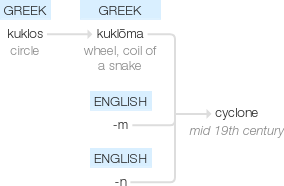Cyclone
mid 19th century: probably from Greek kuklōma ‘wheel, coil of a snake’, from kuklos ‘circle’. The change of spelling from -m to -n is unexplained.
wiktionary
Coined by Henry Piddington, probably in the 1840s, and based on some term in Ancient Greek. Sources disagree on the date and on which Ancient Greek term, though it had to be something derived from either κύκλος(kúklos, “circle, wheel”) or κυκλόω(kuklóō, “go around in a circle, form a circle, encircle”), for example the present active participle κυκλῶν(kuklôn). See cycle and wheel.
etymonline
cyclone (n.)
1848, "extensive storm characterized by the revolution of air around a calm center in which the wind blows spirally around the center," coined by British East India Company official Henry Piddington to describe the devastating storm of December 1789 in Coringa, India; irregularly formed from a Latinized form of Greek kyklon "moving in a circle, whirling around," present participle of kykloun "move in a circle, whirl," from kyklos "circle" (from PIE root *kwel- (1) "revolve, move round"). Applied to tornadoes from 1856.
